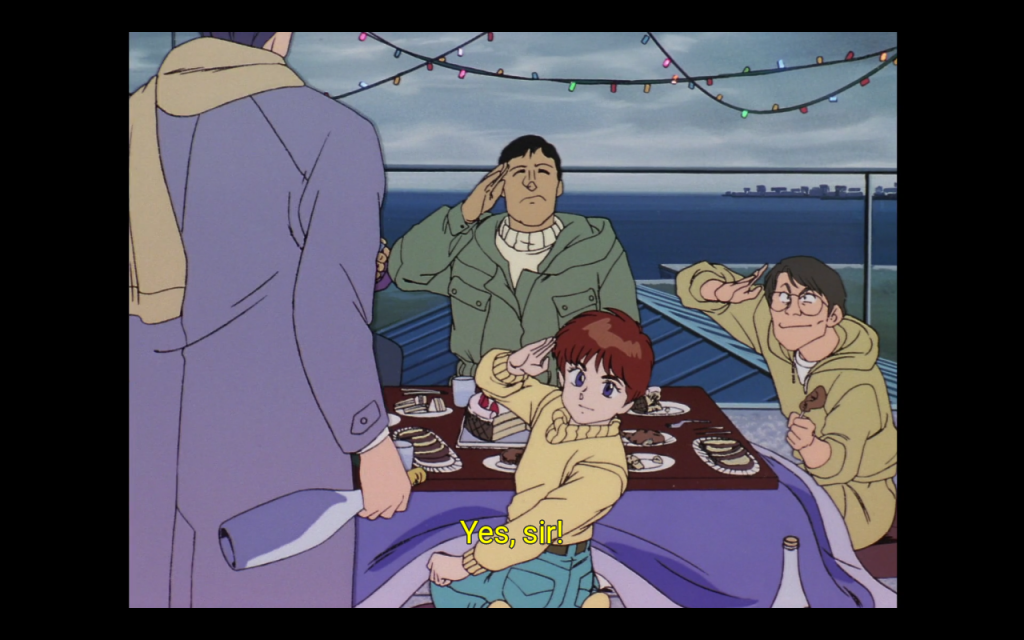Day 11: Victory
May all of our dear readers be enjoying a happy and penitential Advent in preparation for the feast which—to quote the carol “God Rest Ye Merry Gentlemen—”all others doth deface.” For my “12 Days of Christmas” post, I have chosen to reflect on episodes 10 and 11 of Patlabor, which occur on Christmas Eve. For those of you unfamiliar with this anime classic, Patlabor imagines a world in which mecha–called labors in this anime–perform various construction, research, and combat roles. The invention of labors has also inspired criminals to used them in unwholesome ways, leading to the creation of labor police units called patrol labors or patlabors for short.

Our heroes form part of Patlabor’s Second Division in Tokyo, and the action during this particular Christmas Eve focuses on Noa, Asuma, Kanuka, and Kanuka’s grandmother, Rei. You see, Rei has come to Japan to convince Kanuka, a temporary member of Division 2 on loan from New York City’s Patlabor force, to return to the States. Yet, being in Japan brings back old memories for Rei, particularly the Christmas Eve of 1950 when she last saw her American husband alive before he went to fight the communists in Korea. Rei leaves a note for Kanuka to find which declares that she is searching for “the Christmas of fifty years ago.”

Noa and her partner Asuma are with Kanuka when she finds this note, but they have no time to search for Kanuka’s grandmother. They are on standby and an order comes for them to sortie. A mysterious group of labors has attacked two police vehicles and captured the cops inside. These enemies will be the most difficult Noa and her friends have faced thus far.

The juxtaposition of the Korean War and the clandestine fight against these terrorists reminded me of G. K. Chesterton’s assertion that Christmas, besides being the heartwarming and joyful celebration of Christ’s entrance into the world, stands as a declaration of war. Here is what Chesterton writes in his magnum opus, The Everlasting Man, in part II, chapter 1, “The God in the Cave”:
We have also noted that this paradox appeared also in the treatment of the early Church. It was important while it was still insignificant, and certainly while it was still impotent. It was important solely because it was intolerable; and in that sense it is true to say that it was intolerable because it was intolerant. It was resented , because, in its own still and almost secret way, it had declared war. It had risen out of the ground to wreck the heaven and earth of heathenism….Those who charged Christians with burning down Rome with firebrands were slanderers; but they were at least far nearer to the nature of Christianity than those among the moderns who tell us that Christians were a sort of ethical society, being martyred in a languid fashion for telling men that they had a duty to their neighbors, and only mildly disliked because they were meek and mild. (183)

It is for very good reason that the Church on earth has been dubbed the Church Militant. (There is also the Church Triumphant in heaven and the Church Suffering in purgatory, in case you were curious.) Christians were born to be warriors, and the world will not have them be anything else. Perhaps it was for this very reason that Leon Bloy, that famous French Catholic writer dubbed “the Prophet of the Absolute,” wrote “Any Christian who is not a hero is a pig.” It would be better to quote Christ, who speaks in the same vein: “So because thou art lukewarm, and neither hot nor cold, I will spew thee out of my mouth,” (Rev. 3:16). The fate of a Christian who will not fight might well be those of the fallen angels who refused to take sides during the war in heaven: Dante describes them in hell chasing after various banners for all eternity.

The Western world is so peaceful that many Christian have forgotten Christ’s admonition: “If you had been of the world, the world would love its own: but because you are not of the world, but I have chosen you out of the world, therefore the world hateth you,” (John 15:19). The Christian contradicts the spirit of the age, and all who belong to the spirit of the age make war on Christianity. Some, like the Roman pagans, Islamic zealots, and Communists, persecute, torture, and kill Christians. But, many more, like liberals, libertarians, materialists, and hedonists, instead undermine the culture which Christians inhabit, subtly leading them away from Christ until the seed of the Gospel is choked (Matt. 13:7).

In modern America, few Christians will ever have justification to engage the enemies of the Church in mortal combat like Rei’s husband in Patlabor. (The American soldiers who fought ISIS being one exception.) On the other hand, Noa, Asuma, and Kanuka engage in a rather hidden battle against their foes. Tokyo celebrates Christmas without taking any notice of the labor combat taking place among some nearby warehouses.

And, it is in a secret, quiet, humble way that most spiritual combat happens, using prayer, the sacraments, and penance. There exists a great temptation to rely on activism to fight the culture war. Activism and missionary activity without prayer, penance, and the sacraments is like carrying a rifle without ammunition to a battlefield. Take the Pro-Life movement for example: their public protests of abortion always include prayer, for prayer is the key which unlocks the heart of God who can break the hard hearts of men.

So, sometime this Christmas when you are celebrating the birth of Our Savior, remember that Christ declared war on the devil, the flesh, and the world. Through following our brave Captain, may He grant us victory over all three and eternal life. Have a merry Christmas!
—
You can stream episodes 10 and 11) of Patlabor on HiDIVE. Tomorrow, for Christmas Day, we’ll jump into a manga-only Christmas celebration with My Hero Academia chapter 242!
- Lust Will Be Dispatched - 06.09.2021
- How Not to be a Villainess in Your Next Life - 03.24.2020
- 12 Days of Christmas Anime: Patlabor - 12.24.2019


[…] 12 Days of Christmas Anime: Patlabor […]
An excellent essay for the Christmas Eve! I do love Patlabor, though I like the serious timeline (Early Days and the movies) more than the TV series and its sequel (I definitely enjoy the antics in the TV series, but I am by nature a more serious guy, so I like more thoughtful storylines, though the very first OVA had its share of goofiness TBH).
Thanks! I have seen the first movie and remember that the plot was more serious than ones sees in the TV series. I’ll have to get through it so that I can watch Early Days.
I think you’ll love the second movie Patlabor 2: a very Mamoru Oshii movie, done better than Ghost in the Shell dealing with Japanese geopolitics since the Second World War and internal politics with a very evocative and haunting soundtrack.
I’ll have to see that soon then. Thanks for the recommendation!
This was very inspiring. Thank you! I have yet to see Patlabor, but the culture war is very evident and difficult in today’s Spain, and the part about activism and prayer resonates strongly.
Thanks! The culture war seems to be raging almost everywhere in the West with very few countries exempt.
[…] Patlabor (TV) (Eps. 10-11) – “Eve’s Trap,” “Eve’s Terror” [1] […]